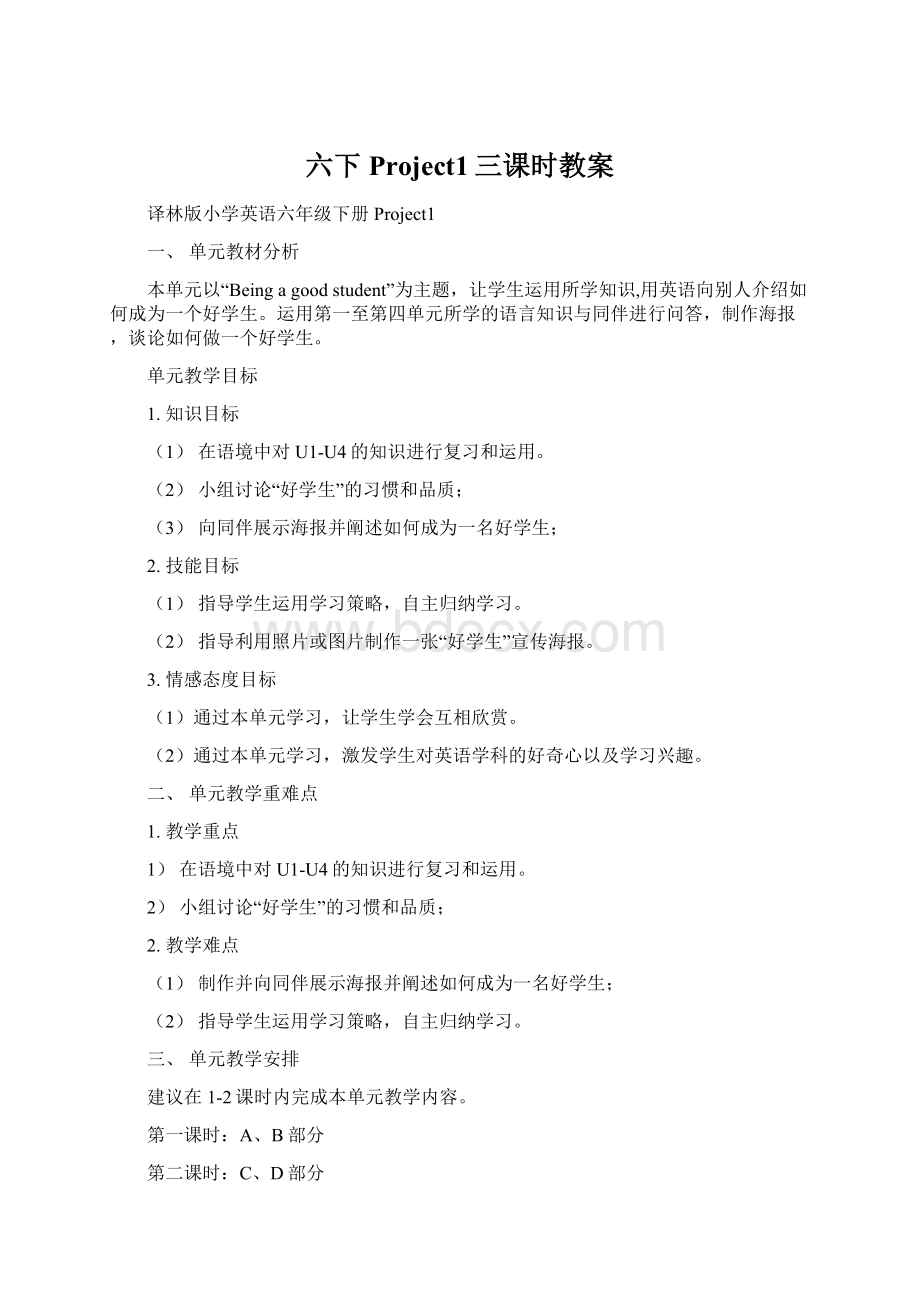六下Project1三课时教案.docx
《六下Project1三课时教案.docx》由会员分享,可在线阅读,更多相关《六下Project1三课时教案.docx(13页珍藏版)》请在冰豆网上搜索。

六下Project1三课时教案
译林版小学英语六年级下册Project1
一、单元教材分析
本单元以“Beingagoodstudent”为主题,让学生运用所学知识,用英语向别人介绍如何成为一个好学生。
运用第一至第四单元所学的语言知识与同伴进行问答,制作海报,谈论如何做一个好学生。
单元教学目标
1.知识目标
(1)在语境中对U1-U4的知识进行复习和运用。
(2)小组讨论“好学生”的习惯和品质;
(3)向同伴展示海报并阐述如何成为一名好学生;
2.技能目标
(1)指导学生运用学习策略,自主归纳学习。
(2)指导利用照片或图片制作一张“好学生”宣传海报。
3.情感态度目标
(1)通过本单元学习,让学生学会互相欣赏。
(2)通过本单元学习,激发学生对英语学科的好奇心以及学习兴趣。
二、单元教学重难点
1.教学重点
1)在语境中对U1-U4的知识进行复习和运用。
2)小组讨论“好学生”的习惯和品质;
2.教学难点
(1)制作并向同伴展示海报并阐述如何成为一名好学生;
(2)指导学生运用学习策略,自主归纳学习。
三、单元教学安排
建议在1-2课时内完成本单元教学内容。
第一课时:
A、B部分
第二课时:
C、D部分
译林版小学英语六年级下册Project1第一课时
教学目标:
1.复习1~4单元主要词句,让学生能充分掌握并灵活运用1~4单元的单词和句型。
2.以“Beingagoodstudent”为主题,交流好习惯和坏习惯,以培养学生的良好习惯。
3.完成相应的练习。
教学重、难点:
1.复习1~4单元主要词句,让学生能充分掌握并灵活运用1~4单元的单词和句型。
2.以“Beingagoodstudent”为主题,交流好习惯和坏习惯,以培养学生的良好习惯。
3.完成相应的练习。
教学过程:
Step1Revision
T:
Goodmorning,children.Doyourememberwhatwelearntinthelastfourunits.
S1:
InUnit1,welearnedastory“Alionandthemouse”.InUnit2,welearntabout“Goodhabits”.Unit3,Ahealthydiet.AndUnit4Roadsafety.
T:
WhatdidyoulearnfromUnit1?
S1:
Weshouldneverlaughatothers.Sometimestheweakcanhelpthestrong.
T:
Great.AndIthinkthestoryalsotoldusweshouldhelpeachother.
T:
Whatgoodhabitsdoyouhave?
S2:
Igetupearly,…
S3:
I…
S4:
I…
S5:
Ihavesomegoodhabits,butIhavesomebadhabitstoo.I…
T:
I’mgladyouhavemanygoodhabits.Youknowwhatbadhabitsyouhave,andyoucantryyourbesttochangethem.
T:
Whatdoyouhaveforbreakfast/lunch/dinner?
S6:
Ihave…for…
T:
Doyouthinkit’sgoodforyourhealth?
S6:
…
T:
Doyouknowhowwecancrosstheroadsafely?
S7:
…
T:
Doyouhaveanyquestionstoaskme?
S8:
…
【设计意图:
让学生自主回顾1至4单元所学主题,选取要点进行问答,重点关注与习惯相关的问题,为下面的交流做好预热。
除了教师问学生,也鼓励学生向老师提问,营造和谐融洽的氛围。
】
Step2Brainstorming
T:
I’mverygladyouremembersomuch.Youstudyhard.Mostofyouaregoodstudents.Whenwetalkaboutgoodstudents,whatwillyouthinkof?
Youcandiscusswithyourpartnersfirst.(教师在黑板上画一个气泡,中间写Goodstudents)
S9:
Goodstudentshavemanygoodhabits.(板书havemanygoodhabits)
S10:
Goodstudentsusuallylistentotheteachercarefully,dotheirhomeworkbeforedinner,…(把学生说到有关学习上的好习惯总结为dowellatschool并板书)
S11:
Goodstudentshaveahealthydiet.(板书haveahealthydiet)
S12:
Goodstudentsalwaysfollowrules,trafficrules,libraryrules,…(板书followrules)
S13:
Goodstudentshelptheirparentsdohousework,helpclassmateswiththeirhomework,helptheelder…(总结为helpful并板书behelpful)
S14:
Goodstudentssay“goodmorning”,“goodbye”toteachers,parentsandfriends.(总结为polite并板书bepolite)
S15:
Goodstudentsnevertelllies.(总结为honest并板书behonest)
(学生可能还会用中文说一些好学生的品质,如勇于尝试,关注环保等,教师可以用英语说一下,简单的可以让学生重复一下)
T:
Goodjob.Youcantellalot.
【设计意图:
头脑风暴有利于激发学生思维。
学生想说但不会用英语表达的内容允许他们适当使用中文,教师再呈现英文,持之以恒能有效扩大学生的词汇量。
】
Step3Makeajudgement
T:
ChaoYangPrimarySchoolwillawardtengoodstudents.Look,Simon,Jack,MayandSuewanttobeoneofthem.Let’shavealookattheirinformation,andthendecidewhoyouwillvotefor.
T:
ReadSimon’sself-introduction.(提示:
阐述理由时请注意主语与动词的一致性)
S16:
Simonisagoodboy.Hehasmanygoodhabits.Hebrusheshisteethinthemorningandbeforebedtime.Heoftenhelpshisclassmateswiththeirhomework.Hegoestobedearly,soheneverfeelssleepyinclass.Helikesreadingverymuch.
T:
WillyouvoteforSimon?
S16:
No.
T:
Whynot?
S16:
BecauseSimonalsohassomebadhabits.Heoftenreadsinbedatnight.It’sbadforhiseyes.Hedrinksalittlewatereveryday,buthedrinksalotofcola.
T:
LookatthepicturesaboutJack.Willyouvoteforhim?
WhyorWhynot?
S17:
Iwillnotvoteforhim.Jackgiveshisseattotheoldwoman.Hekeepshisbedroomcleanandtidy.Hewaitsforthegreenmanbeforehecrossestheroad.Buthespendstoomuchtimeoncomputergames.Heeatstoomuchmeat.That’snotgoodforhealth.
T:
Welldone.LookatpicturesaboutMay.Willyouvoteforher?
S18:
…
T:
Lookatthekeywords.PleasedescribeSue’shabits.Willyouvoteforher?
(提示学生把always,often等频率副词用到句中)
S19:
Suehasmanygoodhabits…Ithinksheisagoodstudent.Iwillvoteforher.
(以上环节中的发言可以由不同的学生互相补充完成,同样的意思也鼓励学生运用多种不同的表达,由于篇幅原因不一一列举)
T:
Let’ssay“Congratulation”toSue.WhatdoesSuewanttosaytotheothers?
S20:
Comeon.Ithinkyoucanbegoodstudentstoo.
T:
Ialsothinktheywillbegoodstudents.
【设计意图:
此环节运用学生自己完整阐述、图片显示、出示关键词等多种方法呈现学生习惯,旨在培养学生的阅读能力、观察能力以及运用语言大胆表达的能力。
】
Step4Readandwrite
T:
Theyhavemanygoodhabitsandthreeofthemhavesomebadhabits.WhataboutAmyandJohn.Pleasereadandfindwhathabitstheyhave.Aretheygoodhabitsorbadhabits?
S:
Readtheshortpassagesandwriteintheirbook.
(Checktheanswer.)
T:
WhatareAmy’sgoodhabits?
S21:
…
T:
What’sherbadhabit?
S22:
…
T:
WhatdoyouwanttosaytoAmy?
S23:
You’regreat!
Youhavemanygoodhabits.Butdonoteattoomanysweetsbecausetheyarebadforyouteeth.
T:
Good!
WhataboutJack?
S24:
…
T:
DoyouwanttosaysomethingtoJack?
S25:
Jack,youareapoliteboy.Youfollowtrafficrules.Butyouhavesomebadhabits.Weshoulddohomeworkfirstafterschool.Wemustn’trunontheroadbecauseit’stoodangerous.Weshouldn’twatchtoomuchTV.Weshouldgotobedearly,sothatwewillnotbelateforschool.Eatingtoomuchmeatisnotgoodforus.Weshouldeatmorevegetables.
T:
Wonderful.IthinkJackwilllistentoyoursuggestionsandchangealot.Thankyou.
【设计意图:
在前面环节中口头表达之后再做教材的阅读书写已是水到渠成,本环节的亮点在于分清好习惯、坏习惯之后你想对Amy和John说什么。
这里可以鼓励学生答案多样化。
】
Step5Workingroups
T:
Whathabitsdoyouhave?
Aretheygoodhabitsorbadhabits?
Pleasetellyourgroupmembersfirst.
S:
….(提示学生小组交流时善于发现组员的优点,组员没有谈到的好习惯可以相互补充)
Step6Showtime
T:
It’stimetoshowyourgoodhabitsnow.Listencarefullytohearwhohasmoregoodhabits.Youcantakenotesifnecessary.Ifyourclassmateshavesomebadhabits,wouldyoupleasegivesomesuggestions?
S:
(学生聆听、记录、提建议)
(板书建议时运用的主要句型:
Youshould…Youshouldn’t… Youmust… Youmustn’t…)
【设计意图:
由教材中的人物到谈论自己的习惯,学生能说的已经很多,此环节关注学生细心聆听、记录的习惯培养。
】
Step7Exercixes
T:
Justnow,whenyoureportedorgavesuggestions,someofyoumadeafewmistakes.Butdon’tworry.Herearesomeexercisesforyou.
Ex.1Ticktherightanswer
Mydiet
Ihaveahealthydiet.Iusuallyhave(some,afew)breadforbreakfast.Ihave(alittle,afew)eggseveryweek.Forlunch,Ioftenhave(alotof,alittle)vegetables,(some,afew)meatand(many,much)rice.Fordinner,Iusuallyeat(some,afew)fishandvegetables.Mybrotherofteneats(alotof,afew)meat.ButIthinkit’sbadforourhealth.Ioftendrink(some,afew)juice,too.
Ithinkfruitisgoodforus.Weshouldeat(alittle,some)everyday.
Healthydiet,healthylife.
ChecktheanswerandSstellwhytheychoosethewords.
Show“afew,alittle,some”etc.Canyoutellthemeanings?
Howtousethem?
S:
(总结这些单词或短语的用法)
Ex.2Fillintheblanks(根据上下文或首字母提示填空)
S:
(学生做练习)
(Checktheanswer.)
【设计意图:
适当的练习能有效巩固学生所学语言知识,提升概括、归纳的能力,最终提高对所学语言的运用能力。
】
Step8Tickingtime
T:
Frank’sfriendshavemanygoodhabits.Ithinkyoualsohave.Youdidagreatjobtoday.It’stickingtimenow.Canyoutellwhichhabitsaregoodandwhicharebad?
Ifyoudo,youcanget3stars.…
T:
Mychildren,it’sveryimportanttoformgoodhabits.Becausegoodhabitmakesabigfuture!
(显示中文:
好习惯成就大未来!
)
【设计意图:
每节课让学生知道自己的学习成果能激励他们不断努力!
】
Homework家庭作业
1.Writeashortpassage“Myhabits”withsomepictures.UseExerciseC.“Lookandsay”intheworkbookasamodel.
仿照补充习题练习C写短文Myhabits,配上生动的图片。
2.Thinkabout“Whatmakesagoodstudent?
”Preparefortheposter.
思考一个好学生应该具有的品质,准备好制作海报的工具。
【设计意图:
鼓励学生课后做图片配短文这类个性化的作业并适时展示,能增强学生的学习热情。
】
板书设计:
Project1Beingagoodstudent
Youshould…
Youshouldn’t…
Youmust…
Youmustn’t…
教学反思:
译林版小学英语六年级下册Project1第二课时
教学目标:
1.在竞赛中帮助学生复习1~4单元主要词句,让学生能充分掌握并灵活运用1~4单元的单词和句型。
2.以”Beingagoodstudent”为主题,帮助学生归纳好习惯和坏习惯,以培养学生的良好习惯。
3.帮助学生尝试制作“Beingagoodstudent”宣传海报。
教学重难点:
1.在竞赛中帮助学生复习1~4单元主要词句,让学生能充分掌握并灵活运用1~4单元的单词和句型。
2.以”Beingagoodstudent”为主题,帮助学生归纳好习惯和坏习惯,以培养学生的良好习惯。
3.帮助学生尝试制作“Beingagoodstudent”宣传海报。
教学过程:
Step1Warm-up
T:
Lookatthepicture,readthesentence(s)andmakeajudgement.
1.There’snotimeforbreakfast.Idon’twanttoeatanything.
S1:
That’sabadhabit.Weshouldeatbreakfasteverymorning.
S2:
Weshouldeatbreakfastontime.
S3:
It’sbadforusifwedon’teatbreakfast.
2.Iftherearenocars,wecanrunredlights.(闯红灯)
S4:
Wemustfollowthetrafficrulesanytime.
S5:
It’sdangeroustorunredlights.
S6:
…
3.Letmeplaysomemoreminutes.Icandomyhomeworkintheevening.
S7:
Weshoulddoourhomeworkfirst.
4.Wemustn’tthrowthingsoutofthecars.
S8:
It’sagoodhabit.It’sdangeroustothrowthingsoutofthecars.
S9:
Theroadwillbeverydirty…
5.Ishouldlistencarefullyandtrytoanswerquestionsinclass.IfIhaveproblems,Imayaskforhelp.
S10:
It’sagoodhabit.…
6.Thetrafficisheavy.Let’sparkourcarsonthepavement.
S11:
It’sabadhabit.Wemustn’tparkourcarshereandthere…
7.GrandmaandGrandpaaresleeping.Youcan’tsingloudly,butyoucanreadbooks.
S12:
…
8.UncleWangisalwaysbusy.Heoftenhasfastfoodforlunch.
S13:
…
9.Eddiehasahealthylifestyle.
T:
DoesEddieshaveahealthylifestyle?
S14:
Yes.Helikeswalking.
T:
Whatdoyouthink,S15?
S15:
Idon’tthinkso.“Iwalktomybowlmanytimesaday.”meansEddielikeseatingverymuch.Heshouldnoteattoomuch.Heshoulddomoreexercise.
【设计意图:
培养学生阅读、观察的细致程度。
最后一张图片是七年级上册的漫画,让学生先熟悉一下初中教材,有利于中小衔接;图片中的句子会误导一些思维不缜密的学生,让学生自己意识到一定要有细致、专注的好习惯。
】
Step2Discussandwrite
T:
Manypeoplelikesports.MaybeEddiewantstodosomeexercise,butheisalittlelazy.Youcannotlearnfrom